Asian markets track US losses as Fed raises economy concerns
World equities have surged from a March bottom thanks to a wall of cash support from the Fed and other central banks, but with the multi-trillion-dollar fiscal rescue hammered out earlier this year now running out, US lawmakers are under pressure to stump up more.
While Democrats and Republicans dig their heels in on a new package, the chances of anything coming soon are slim.
With the coronavirus continuing to ravage the country and containment measures keeping businesses closed, minutes from the Fed’s July meeting showed it was concerned about the recovery as help for small businesses, extra money for the jobless and direct payments to all Americans come to an end.
“A number of participants observed that, with some provisions of the CARES Act set to expire shortly against the backdrop of a still-weak labour market, additional fiscal aid would likely be important for supporting vulnerable families, and thus the economy more broadly, in the period ahead,” according to the minutes.
Policymakers added that the “prospects for further substantial improvement in the labour market would depend on a broad and sustained reopening of businesses”, which would “depend in large part on the efficacy of health measures taken to limit the spread of the virus”.
Bank boss Jerome Powell has led repeated calls for more government support for the economy.
The bank is likely more worried about the pace of the recovery “given the stalemate on fiscal stimulus in Washington”, Marvin Loh, at State Street, said.
“The Fed will continue to do what it can, but it does feel that fiscal is as important in the recovery process as monetary, and their tools to get funds to Main Street remain constrained.”
– No ‘air balloon’ –
The minutes sent US markets, which had been enjoying more gains, into the red on concerns the bank would not be providing any more of the easing measures that have kept stocks afloat for so long.
And Asia followed suit.
Hong Kong shed 1.8 percent and Tokyo went into the break 0.7 percent lower while Shanghai and Sydney each shed 0.9 percent.
Taipei and Seoul both lost more than two percent, and Singapore was off more than one percent. Manila and Wellington were also well down.
“Without the Fed air balloon floating markets… stocks are temporarily succumbing to forces of gravity,” said Stephen Innes at AxiCorp.
But he added that with borrowing costs expected to sit around record lows for up to three years, “it is unlikely US stocks will have to deal with a particularly deep or intense air pocket as the wall of money argument seems always to win out”.
Adding to the downward pressure were ever-present China-US tensions, with the White House on Wednesday withdrawing from three bilateral deals with Hong Kong on extradition and taxation over the city’s controversial security law.
The move comes after the US revoked Hong Kong’s preferential trade status and is the latest blow to an increasingly fractious relationship between the superpowers that has fanned concerns about their crucial trade pact signed in January.
Still, there was some joy in a report from Bloomberg News saying the two planned to hold talks on a review of that agreement that were postponed last weekend.
It comes after Trump said this week that he had called the discussions off, adding he “didn’t want to talk to China right now”.
– Key figures around 0230 GMT –
Tokyo – Nikkei 225: DOWN 0.7 percent at 22,948.86 (break)
Hong Kong – Hang Seng: DOWN 1.8 percent at 24,722.05
Shanghai – Composite: DOWN 0.9 percent at 3,377.41
Euro/dollar: DOWN at $1.1839 from $1.1841 at 2100 GMT
Dollar/yen: DOWN at 106.09 yen from 106.12 yen
Pound/dollar: DOWN at $1.3090 from $1.3093
Euro/pound: UP at 90.44 pence from 90.40 pence
West Texas Intermediate: DOWN 1.0 percent at $42.52 per barrel
Brent North Sea crude: DOWN 0.8 percent at $45.02 per barrel
New York – Dow: DOWN 0.3 percent at 27,692.88 (close)
London – FTSE 100: UP 0.6 percent at 6,111.98 (close)
Disclaimer: Validity of the above story is for 7 Days from original date of publishing. Source: AFP.


